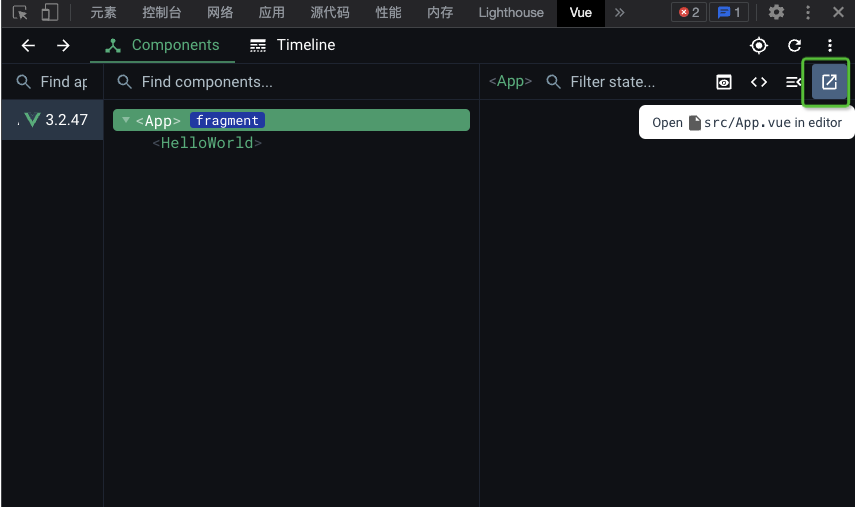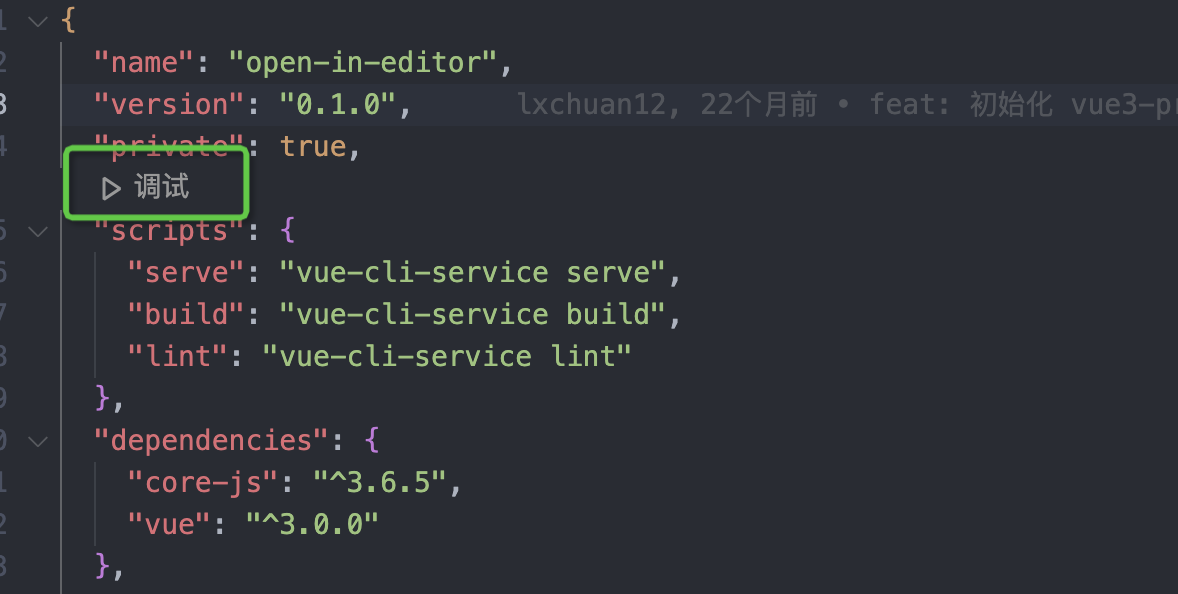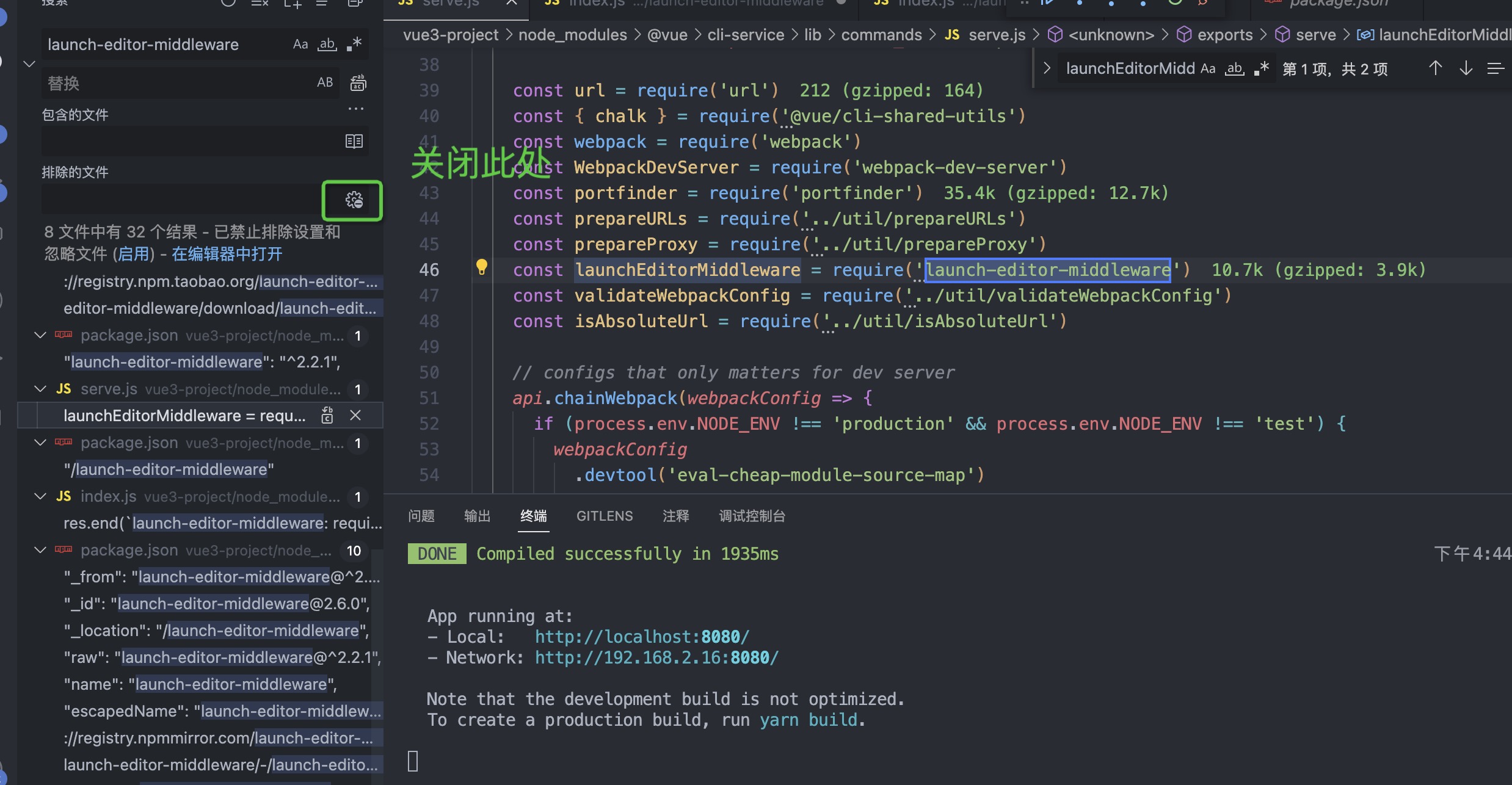launch-editor-middleware源码阅读
功能
可以在开发环境中点击vue-devtools中的按钮直接用编辑器打开源码文件。
环境准备
- 可以先创建一个vue脚手架项目
- 找到调试按钮,开启调试

- 找到launch-editor-middleware所在位置,可以用vscode全局搜索

原理
1、注册路由,访问/__open-in-editor时,执行中间件。
javascript
before (app, server) {
// launch editor support.
// this works with vue-devtools & @vue/cli-overlay
app.use('/__open-in-editor', launchEditorMiddleware(() => console.log(
`To specify an editor, specify the EDITOR env variable or ` +
`add "editor" field to your Vue project config.\n`
)))
// allow other plugins to register middlewares, e.g. PWA
api.service.devServerConfigFns.forEach(fn => fn(app, server))
// apply in project middlewares
projectDevServerOptions.before && projectDevServerOptions.before(app, server)
},
2、中间件函数代码
javascript
module.exports = (specifiedEditor, srcRoot, onErrorCallback) => {
// 如果只传了一个参数,则将specifiedEditor赋值给onErrorCallback,并将specifiedEditor赋为undefined
if (typeof specifiedEditor === 'function') {
onErrorCallback = specifiedEditor
specifiedEditor = undefined
}
// 如果只传了两个参数,则将srcRoot赋值给onErrorCallback,并将srcRoot赋为undefined
if (typeof srcRoot === 'function') {
onErrorCallback = srcRoot
srcRoot = undefined
}
srcRoot = srcRoot || process.cwd() // 设置根目录
return function launchEditorMiddleware (req, res, next) {
const { file } = url.parse(req.url, true).query || {} // 解析文件名
if (!file) { // 处理文件名不存在的情况
res.statusCode = 500
res.end(`launch-editor-middleware: required query param "file" is missing.`)
} else {
launch(path.resolve(srcRoot, file), specifiedEditor, onErrorCallback)
res.end()
}
}
}
3、launch函数干了什么
javascript
function launchEditor (file, specifiedEditor, onErrorCallback) {
const parsed = parseFile(file) // 解析文件名称,行号和列号
let { fileName } = parsed
const { lineNumber, columnNumber } = parsed
if (!fs.existsSync(fileName)) {
return
}
if (typeof specifiedEditor === 'function') {
onErrorCallback = specifiedEditor
specifiedEditor = undefined
}
onErrorCallback = wrapErrorCallback(onErrorCallback)
// 获取编辑器类型
const [editor, ...args] = guessEditor(specifiedEditor)
if (!editor) {
onErrorCallback(fileName, null)
return
}
// ...省略
// 可以理解为单例模式
if (_childProcess && isTerminalEditor(editor)) {
_childProcess.kill('SIGKILL')
}
// 执行打开文件的命令
if (process.platform === 'win32') {
_childProcess = childProcess.spawn(
'cmd.exe',
['/C', editor].concat(args),
{ stdio: 'inherit' }
)
} else {
_childProcess = childProcess.spawn(editor, args, { stdio: 'inherit' })
}
// 执行完成后的相应操作
_childProcess.on('exit', function (errorCode) {
_childProcess = null
if (errorCode) {
onErrorCallback(fileName, '(code ' + errorCode + ')')
}
})
// 执行报错的相应操作
_childProcess.on('error', function (error) {
onErrorCallback(fileName, error.message)
})
}
wrapErrorCallback函数
传入一个回调函数,并返回一个带有默认打印信息的函数。
javascript
function wrapErrorCallback (cb) {
return (fileName, errorMessage) => {
console.log()
console.log(
colors.red('Could not open ' + path.basename(fileName) + ' in the editor.')
)
if (errorMessage) {
if (errorMessage[errorMessage.length - 1] !== '.') {
errorMessage += '.'
}
console.log(
colors.red('The editor process exited with an error: ' + errorMessage)
)
}
console.log()
if (cb) cb(fileName, errorMessage)
}
}
总结
- 大致原理可以理解为:
1.1 首先注册一个后端路由,当在vue-devtools中点击查看文件时,会拿着文件路径去请求此路由。
1.2 此路由被请求到时,会解析路径,如果file参数没有传的话,直接返回500错误。
1.3 之后就是解析文件信息,包括名称、行列号,获取当前编辑器,并利用child_process模块执行相应的命令。
 lrurif
lrurif